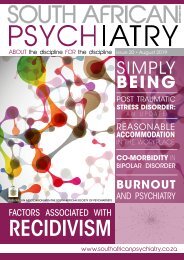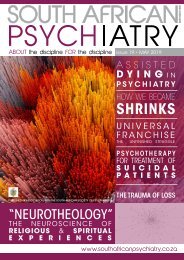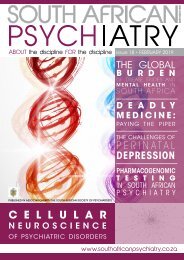South African Psychiatry - November 2020
South African Psychiatry - November 2020
South African Psychiatry - November 2020
You also want an ePaper? Increase the reach of your titles
YUMPU automatically turns print PDFs into web optimized ePapers that Google loves.
ADHD CONGRESS
1 ST SOUTHERN AFRICAN MULTIDISCIPLINARY ADHD CONGRESS
untreated ADHD leads to higher rates of substance
abuse than in individuals who have been treated.
Substance use is often earlier and more severe
in individuals with ADHD and there is a greater
likelihood of a variety of substances being used.
Treatment should be closely supervised particularly
with stimulants where abuse or diversion is a
concern. Atomoxetine might then be selected or
long acting stimulants with lower abuse potential.
Importantly, evidence does not support the idea
that treating ADHD with stimulants leads to drug
abuse either by sensitization or as a gateway drug.
Sleep problems
VERY COMMON, 66% OF PATIENTS HAVE
SOME FORM OF SLEEP PROBLEM.
Lifestyle interventions For ADHD, by Dr R Liebenberg
Most international guidelines recommend a
multimodal management approach for the treatment
of ADHD which includes pharmacological
management as well as psychosocial interventions.
Exercise, sleep management and dietary
interventions all have a role to play.
Psychotherapy of various types and coaching
can be useful targeting individual patient issues.
Workplace interventions can also be very helpful
in assisting adults with ADHD to more efficiently
navigate their working lives.
ADHD: Ethical Issues, by Dr C Verster
There are numerous studies looking at the use
of methylphenidate as a cognitive enhancer
amongst students. The samples are generally small
and the overall effectiveness is not convincingly
shown. Despite this, students continue to use
methylphenidate. There is no clear guidance by
regulatory bodies, but the medical community
has a duty to evaluate the risk benefit ratio and
inform patients and families of this. This bioethical
conundrum will increasingly be encountered.
When parents refuse to let their children with ADHD
use methylphenidate:
This was discussed using the pillars or principles of
Bioethics, including Autonomy, Beneficence, Non-
Maleficence and Justice.
Exposure to negative information is a common
cause of parental concern and suspicion. The
single most effective factor regarding the attitude
towards methylphenidate treatment is the quality of
the doctor’s explanation.
The anti-psychiatry movement and Scientology
have a role to play in promoting negative
information. Pharmacists and General practitioners
may also have unhelpful and misinformed attitudes
regarding the validity of ADHD as a construct and
the use of medication.
Mainstream psychiatry recognizes ADHD as a
disorder, the treatment as being well described
and proven and that NOT treating ADHD is far more
damaging. Methylphenidate is highly regulated,
but it has a very good safety record, nevertheless
concerns are generally acknowledged.
NOT TREATING ADHD IN LIGHT OF ALL
THAT IS KNOWN DOES NOT FIT WITH THE
PRINCIPLE OF NON-MALEFICENCE.
The Children’s Act of 2005 states that all actions or
decisions concerning a child must be in the best
interests of the child.
THE ACT ALSO STATES THAT NO
GUARDIAN MAY REFUSE TO ASSIST THE
CHILD OR WITHHOLD CONSENT FOR
WHATEVER REASON UNLESS THEY CAN
SHOW THAT THERE IS A MEDICALLY
ACCEPTED ALTERNATIVE CHOICE.
The question “Should parents be forced to let
their children be treated?” was looked at from the
perspective of the Harm principle and compared to
life threatening conditions where it is clearer, such
as refusal of blood transfusion.
The question of whether doctors may refuse to
prescribe methylphenidate, was discussed with
referral to other conditions where conscientious
objection may occur.
In conclusion, our ethical responsibilities regarding
ADHD include following evidence-based medicine,
ensuring that patients and families are psychoeducated,
promote community education, confront
misinformation, and if necessary, approach the
press ombudsman.
This workshop over two evenings was extremely
comprehensive, with up to date scientific information
presented in a very accessible way. Thank you to
the presenters for all the hard work and time that
went into preparing their presentations.
Linda Kelly is a child and adolescent psychiatrist in private
practice in Johannesburg. Her interests include ADHD, ASD
and anxiety disorders, amongst others
SOUTH AFRICAN PSYCHIATRY ISSUE 25 2020 * 39
















